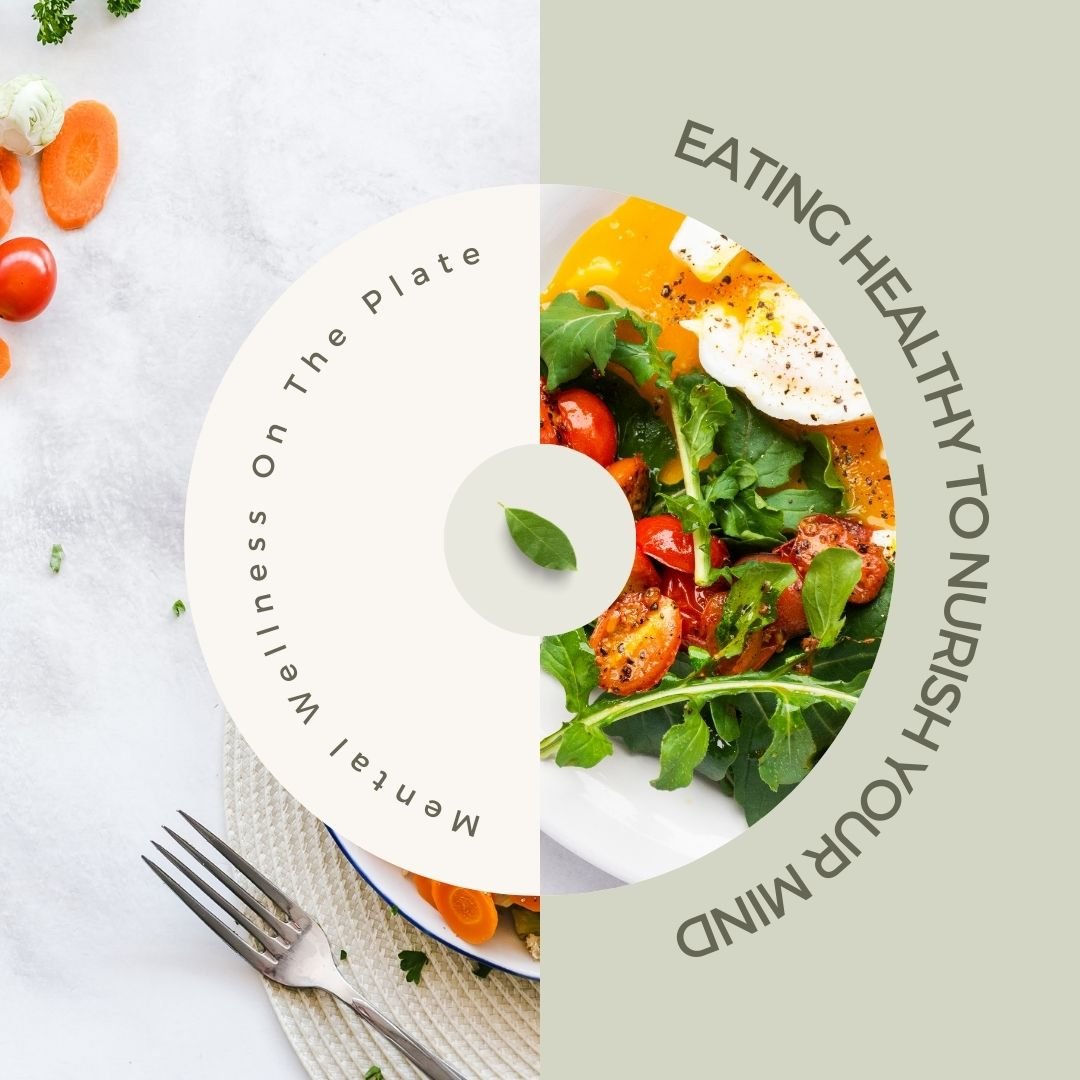Nutrition and Mental Well-Being
When exploring the vital intersection of diet and nutrition with mental health and well-being, it’s crucial to acknowledge the significant burden of mental, neurological, and substance-use disorders worldwide. While conventional treatments for mental health issues usually involve medications and therapy, they often fail to fully meet the multifaceted needs of individuals dealing with these conditions. This means that aspects such as social support, lifestyle changes, and nutritional considerations may not be adequately addressed in the treatment plan.
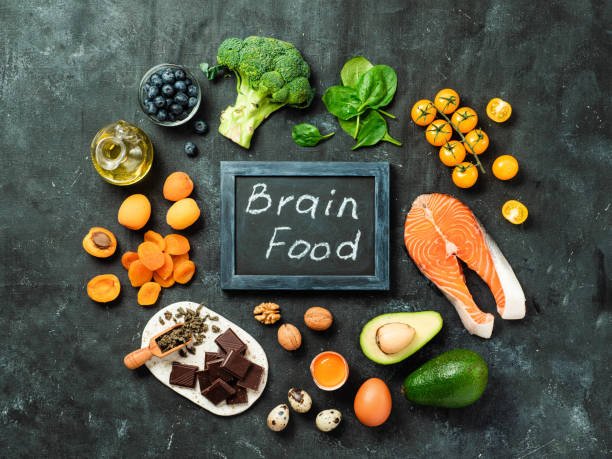
The Latin phrase “Mens sana in corpore sano” (a healthy mind in a healthy body) succinctly captures the intrinsic link between physical and mental health.
In recent years, research has increasingly emphasized the profound impact of nutrition and physical activity on mental well-being. This evolving insight highlights the necessity of expanding our approach to mental health support.
Consistent studies have highlighted the correlation between nutrition, physical fitness, and mental health across various age groups. This correlation suggests that interventions targeting diet optimization and increased physical activity offer promise as preventive, treatment, or adjunctive measures for mental disorders.
Here are some examples that demonstrate this connection:
Children and Adolescents
Research indicates that children and adolescents who consume a healthy diet rich in fruits, vegetables, whole grains, and lean proteins tend to have better cognitive function, mood stability, and overall mental well-being. Additionally, regular physical activity (team sports, outdoor play, dance classes, swimming gymnastics etc.) during childhood and adolescence has been linked to improved self-esteem, reduced symptoms of anxiety and depression, and better academic performance.

Here’s a sample daily menu plan for children that incorporates a variety of fruits, vegetables, whole grains, and lean proteins to support cognitive function, mood stability, and overall mental well-being:
Breakfast:
– Whole-grain banana pancakes: Make pancakes using whole-grain flour and mashed bananas for added sweetness and fiber. Serve with a dollop of Greek type yogurt and a drizzle of honey for protein and calcium.
– Fresh fruit salad: Combine a variety of fresh fruits such as strawberries, blueberries, pineapple, and kiwi for a colourful and nutrient-rich side dish.
– Glass of milk or fortified plant-based milk: Provide a glass of milk or fortified plant-based milk (such as almond or soy milk) for additional protein and essential nutrients like calcium and vitamin D.
Mid-Morning Snack:
– Sliced apples with almond butter: Offer slices of apples paired with almond butter for a satisfying and nutritious snack high in fiber, vitamins, and healthy fats.
– Whole grain toast or English muffin with avocado spread.
Lunch:
– Turkey and veggie wrap: Fill a whole-grain tortilla with sliced turkey breast, lettuce, tomato, cucumber, and avocado. Roll up the wrap and slice into bite-sized pieces for easy eating.
– Carrot sticks and hummus: Serve carrot sticks with a side of hummus for a crunchy and flavourful snack rich in fiber, vitamins, and minerals.
– Water or herbal tea: Encourage hydration with water or herbal tea throughout the day.
Afternoon Snack:
– Greek type yogurt with granola and berries: Offer Greek yogurt topped with granola and mixed berries (such as raspberries, blackberries, and blueberries) for a delicious and nutritious snack high in protein, fibre, and antioxidants.
Dinner:
– Baked salmon with quinoa and steamed broccoli: Bake salmon fillets seasoned with herbs and lemon juice. Serve with a side of quinoa cooked with vegetables (such as diced bell peppers and onions) and steamed broccoli florets.
– Mixed green salad: Offer a side salad of mixed greens (such as spinach, kale, and romaine lettuce) topped with cherry tomatoes, cucumber slices, and a light vinaigrette dressing.
– Glass of water or milk: Provide a glass of water or milk to accompany the meal and promote hydration.
Evening Snack:
– Banana and peanut butter smoothie: Blend a ripe banana with a scoop of peanut butter, milk or yogurt, and a handful of spinach for a creamy and nutritious smoothie packed with vitamins, minerals, and protein.
This daily menu plan provides a balanced combination of nutrient-rich foods that support cognitive function, mood stability, and overall mental well-being in children. By incorporating fruits, vegetables, whole grains, and lean proteins into meals and snacks, parents can help promote healthy growth and development in their children while fostering good eating habits for life. Adjust portion sizes and food choices according to individual preferences and dietary needs.
Adults
In adults, maintaining a balanced diet and engaging in regular exercise has been associated with a lower risk of developing mood disorders such as depression and anxiety. Nutrient-rich foods, such as those high in omega-3 fatty acids, antioxidants, and vitamins B and D, have been shown to support brain health and reduce inflammation, which can positively impact mental health. Furthermore, physical activity has been found to release endorphins, neurotransmitters that help alleviate stress and improve mood.

Here’s a sample daily meal plan that incorporates nutrient-rich foods known to support brain health and reduce the risk of mood disorders like depression and anxiety:
Breakfast:
– Smoked salmon and avocado whole-grain toast: Whole-grain toast topped with smoked salmon, sliced avocado, and a sprinkle of chia seeds for added omega-3 fatty acids.
– Greek type yogurt parfait with berries and nuts: Greek yogurt layered with mixed berries (such as blueberries, strawberries, and raspberries) and chopped nuts (like almonds or walnuts) for antioxidants and healthy fats.
– Green tea: A cup of green tea, rich in antioxidants and L-theanine, to promote relaxation and mental clarity.
Mid-Morning Snack:
– Carrot sticks with hummus: Fresh carrot sticks paired with hummus for a satisfying snack high in fibre, vitamins, and minerals.
– Mixed nuts and seeds: A small handful of mixed nuts and seeds (such as almonds, pumpkin seeds, and sunflower seeds) for a boost of omega-3 fatty acids and protein.
Lunch:
– Quinoa and vegetable salad: Quinoa mixed with a variety of colourful vegetables (such as bell peppers, cucumbers, cherry tomatoes, and spinach) tossed in a lemon-tahini dressing for a nutrient-rich meal high in fiber and antioxidants.
– Grilled chicken or tofu: Grilled chicken breast or tofu slices served on top of the quinoa and vegetable salad for lean protein.
– Mineral water with lemon: A refreshing glass of mineral water with a squeeze of lemon for hydration and a dose of vitamin C.
Afternoon Snack:
– Dark chocolate and almond butter: A square of dark chocolate paired with a tablespoon of almond butter for a decadent yet nutritious snack rich in antioxidants and healthy fats.
– Sliced apple with peanut butter: Crisp apple slices dipped in peanut butter for a satisfying combination of fibre, protein, and vitamin E.
Dinner:
– Baked salmon with roasted vegetables: Baked salmon fillet seasoned with herbs and served with a side of roasted vegetables (such as broccoli, cauliflower, and carrots) drizzled with olive oil for omega-3 fatty acids and vitamins.
– Quinoa pilaf: Fluffy quinoa cooked with onions, garlic, and herbs for a hearty and nutrient-dense grain side dish.
– Mixed green salad: A side salad of mixed greens (such as kale, arugula, and romaine lettuce) topped with sliced avocado, cherry tomatoes, and a balsamic vinaigrette dressing for additional fibre and vitamins.
Evening Snack:
– Greek type yogurt with honey and berries: Creamy Greek yogurt topped with a drizzle of honey and a handful of fresh berries (such as raspberries or blackberries) for a sweet and nutritious dessert high in probiotics, antioxidants, and vitamins.
This daily meal plan provides a balanced combination of nutrient-rich foods that support brain health and reduce inflammation, which can positively impact mental health and reduce the risk of mood disorders like depression and anxiety. Adjust portion sizes and food choices according to individual preferences and dietary needs.
Elderly Population
Among the elderly, proper nutrition and physical activity are crucial for maintaining cognitive function and reducing the risk of age-related cognitive decline and dementia. Adequate intake of nutrients like omega-3 fatty acids and antioxidants has been associated with a lower risk of cognitive impairment and dementia. Regular exercise, including activities like walking, swimming, or strength training, can also help preserve cognitive function, enhance mood, and improve overall quality of life in older adults.

Here’s a sample daily meal plan designed to support cognitive function and reduce the risk of age-related cognitive decline and dementia among the elderly, incorporating foods rich in omega-3 fatty acids, antioxidants, and other nutrients:
Breakfast:
– Overnight oats with berries and nuts: Combine rolled oats with almond milk, chia seeds, and a dash of cinnamon. Top with a mix of berries (such as blueberries, strawberries, and raspberries) and chopped nuts (like walnuts or almonds) for added antioxidants and omega-3 fatty acids.
– Green tea: Enjoy a cup of green tea alongside breakfast for its antioxidant properties and potential cognitive benefits.
Mid-Morning Snack:
– Greek type yogurt with honey and flaxseeds: Enjoy a serving of Greek yogurt topped with a drizzle of honey and a sprinkle of ground flaxseeds for probiotics, antioxidants, and omega-3 fatty acids.
Lunch:
– Grilled salmon salad: Grilled salmon fillet served on a bed of mixed greens (such as spinach, kale, and arugula) with cherry tomatoes, cucumbers, and avocado slices. Drizzle with a light vinaigrette dressing made with olive oil and lemon juice for healthy fats and antioxidants.
– Whole-grain roll: Enjoy a small whole-grain roll on the side for additional fiber and complex carbohydrates.
Afternoon Snack:
– Flaxseed crackers paired with hummus provide a satisfying and omega-3 rich snack option. Flaxseeds are a plant-based source of omega-3s.
– Mixed nuts: Enjoy a small handful of mixed nuts (such as almonds, walnuts, and pecans) for a dose of healthy fats, protein, and antioxidants.
Dinner:
– Baked chicken breast with quinoa and roasted vegetables: Season a chicken breast with herbs and spices, then bake until tender. Serve with a side of quinoa cooked with onions and garlic, and a variety of roasted vegetables (such as broccoli, cauliflower, and bell peppers) tossed in olive oil.
– Steamed broccoli with lemon: Enjoy a side of steamed broccoli drizzled with lemon juice for added flavor and vitamin C.
Evening Snack:
– Berries and dark chocolate: Enjoy a small bowl of mixed berries (such as raspberries, blackberries, and strawberries) alongside a square of dark chocolate for a delicious and antioxidant-rich dessert.
This daily meal plan provides a balance of nutrient-rich foods that support cognitive function and reduce the risk of age-related cognitive decline and dementia among the elderly. Incorporating omega-3 fatty acids, antioxidants, and other essential nutrients into meals can help promote brain health and overall well-being. Adjust portion sizes and food choices according to individual preferences and dietary needs.
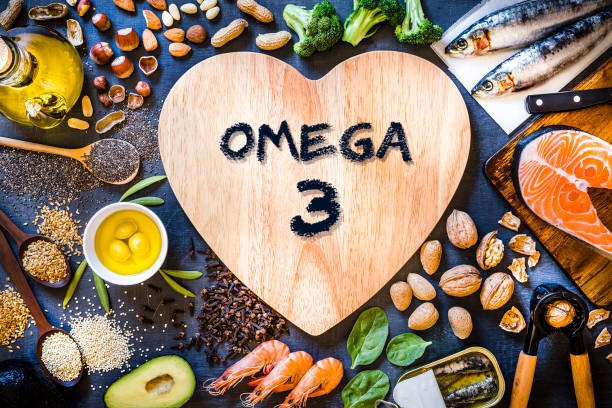
Nutrition as a Modifiable Risk Factor
Diet plays a significant role in shaping different aspects of human health, including behaviour and mood control. Research consistently shows how specific nutrients like omega-3 fatty acids, vitamins, minerals, and antioxidants can affect how the brain functions, communicates between neurons, and manages inflammation.
Moreover, dietary habits, including the consumption of processed foods, excessive sugar, and unhealthy fats, have been linked to an increased risk of mood disorders, such as depression and anxiety, as well as cognitive decline and neurodegenerative diseases. These findings underscore the importance of adopting a balanced and nutrient-rich diet to support optimal mental health outcomes.
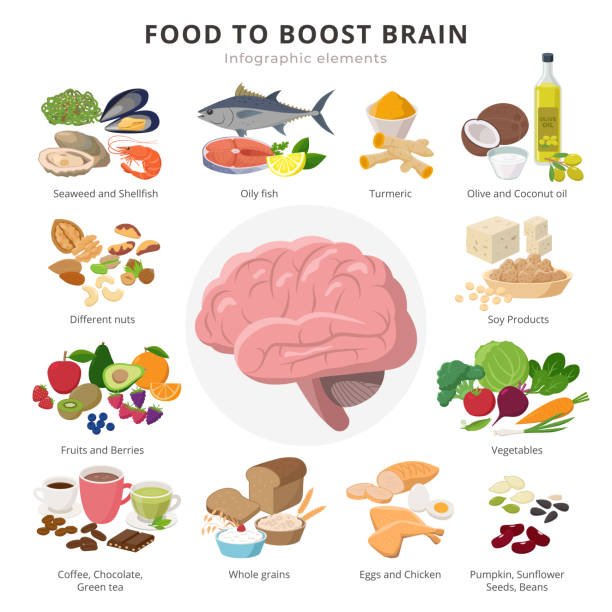
Encouraging dietary approaches that emphasize whole foods, lean proteins, fruits, vegetables, and healthy fats can potentially lower the likelihood of mental health disorders and enhance overall brain function and resilience.
Below is a suggested daily meal plan that emphasizes whole foods, lean proteins, fruits, vegetables, and healthy fats, aimed at reinforcing mental health and supporting optimal brain function:

Breakfast:
– Scrambled eggs with spinach and tomatoes cooked in olive oil
– Whole grain toast
– A side of mixed berries (blueberries, strawberries, raspberries)
Mid-Morning Snack:
– Greek type yogurt topped with almonds and a drizzle of honey
Lunch:
– Grilled chicken breast salad with mixed greens, avocado, cucumbers, bell peppers, and a vinaigrette dressing made with olive oil and balsamic vinegar
– Quinoa or brown rice on the side
Afternoon Snack:
– Sliced apples or carrots with a tablespoon of almond butter
Dinner:
– Baked salmon seasoned with herbs and lemon
– Steamed broccoli and carrots
– A small serving of sweet potatoes or whole grain pasta
Evening Snack (optional):
– A small handful of walnuts or pumpkin seeds
Hydration throughout the day:
Drink plenty of water, herbal teas, or infused water with slices of cucumber, lemon, or mint.

This meal plan provides a balance of macronutrients (protein, carbohydrates, and fats) and includes a variety of micronutrients from fruits and vegetables, which are essential for brain health and overall well-being. Additionally, incorporating healthy fats like those found in salmon, nuts, and olive oil can support cognitive function and mood regulation.
Recognizing nutrition as a modifiable risk factor for mental illnesses underscores the importance of adopting a holistic approach to mental health care.
By prioritizing nutrition interventions alongside traditional treatment modalities, we can potentially reduce the burden of mental and neurological diseases while promoting overall well-being and resilience.
Preventative Measures through Nutrition
Nutritional psychiatry is emerging as a proactive and preventive approach to mental health, highlighting how our food choices can greatly affect our risk of developing psychiatric symptoms. Extensive research underscores the profound impact of dietary patterns on mental well-being, indicating that specific diets may play a role in reducing the onset and severity of mental disorders.
One prominent diet in this field is the Mediterranean-style diet, known for its positive effects. This dietary approach involves consuming ample fruits, vegetables, whole grains, legumes, nuts, and olive oil, while minimizing intake of processed foods, red meat, and refined sugars. Its potential to promote mental health has garnered considerable attention.
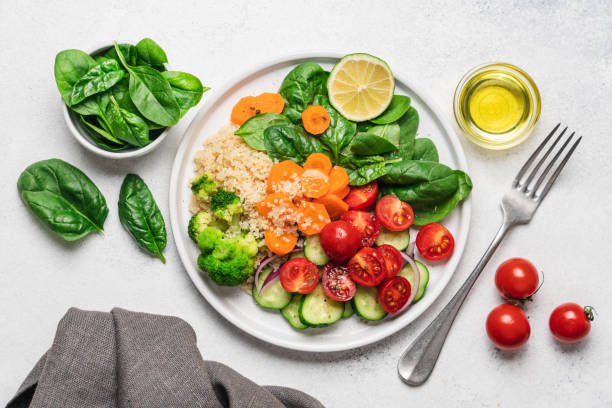
Here’s a sample daily meal plan based on the Mediterranean-style diet:
Breakfast:
– Greek type yogurt topped with honey and mixed berries
– Whole grain toast with avocado slices
– A handful of almonds
– Herbal tea or coffee
Mid-Morning Snack:
– A piece of fruit (e.g., apple, orange, or pear)
Lunch:
– Grilled chicken or salmon salad with mixed greens, tomatoes, cucumbers, olives, and feta cheese, dressed with olive oil and lemon juice
– Whole grain pita bread on the side
– Water or sparkling water with lemon
Afternoon Snack:
– Hummus with carrot sticks and cucumber slices
– Whole grain crackers
– Herbal tea or water
Dinner:
– Baked or grilled fish (such as salmon or sea bass) seasoned with herbs and lemon
– Quinoa or bulgur pilaf with mixed vegetables (bell peppers, onions, zucchini)
– Steamed broccoli or green beans tossed with olive oil and garlic
Evening Snack (optional):
– A small bowl of mixed nuts (e.g., almonds, walnuts, pistachios)
Hydration throughout the day:
– Water, herbal teas, or a glass of red wine (in moderation).
This Mediterranean-style meal plan is rich in nutrient-dense foods, including plenty of fruits, vegetables, whole grains, and healthy fats from olive oil and nuts. It provides a balance of macronutrients and incorporates key components of the Mediterranean diet known for promoting heart health, cognitive function, and overall well-being.
Comparative analyses between the Mediterranean diet and the Western dietary pattern, typified by high consumption of processed foods, sugar-laden beverages, and saturated fats, reveal striking differences in their respective impacts on mental well-being.
Research findings consistently demonstrate that individuals adhering to a Mediterranean-style diet exhibit lower risks of developing a spectrum of mental health disorders, including depression, anxiety, and cognitive decline, in contrast to those following a typical Western diet.

The Mediterranean diet’s protective qualities stem from its wealth of nutrients and bioactive compounds, which offer diverse benefits for brain health. Essential elements like omega-3 fatty acids, prevalent in fish and nuts, boast anti-inflammatory properties and crucially support neurotransmitter function, bolstering resilience against mood disorders. For example, they help serotonin—a neurotransmitter known for its role in mood regulation—work more effectively, which can help us feel happier and more resilient against conditions like depression.
Moreover, the high consumption of antioxidants from fruits and vegetables in the Mediterranean diet helps mitigate oxidative stress and combat cellular damage, which are implicated in the pathogenesis of psychiatric conditions. Additionally, the inclusion of complex carbohydrates from whole grains and legumes provides a steady source of glucose to the brain, supporting optimal cognitive function and mood regulation.
Furthermore, the Mediterranean diet’s emphasis on monounsaturated fats, predominantly from olive oil, not only promotes cardiovascular health but also fosters neuroplasticity and synaptic integrity, crucial for maintaining optimal mental acuity and emotional well-being.
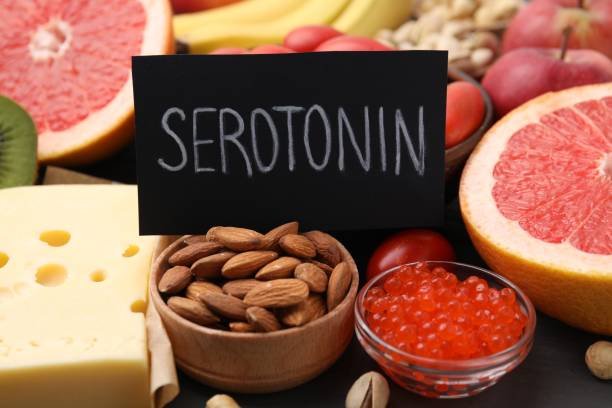
Advances in Nutraceuticals
The growing area of nutraceuticals, which includes natural compounds found in food believed to have health benefits, is gaining attention for its potential to positively affect mood and cognitive function. As there’s a rising interest in holistic mental health practices, studies on the therapeutic effects of nutraceuticals are increasing. This research reveals how these compounds can optimize brain function and enhance emotional resilience.
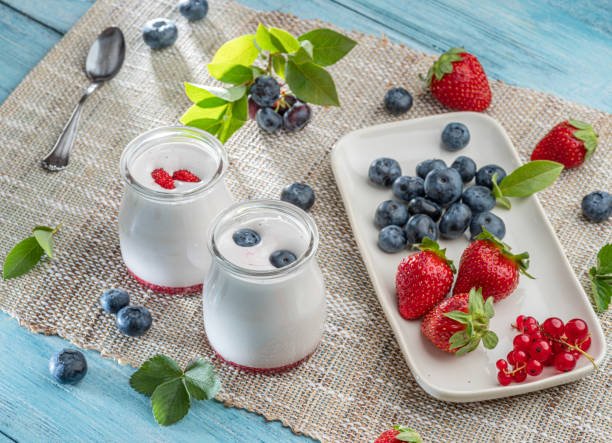
Here’s a sample daily meal plan rich in nutraceuticals:
Breakfast:
– avocado toast with poached eggs: whole grain toast provides fiber and essential nutrients. Avocado is rich in healthy fats, vitamins, and minerals. For additional vitamins and minerals add spinach (optional)
– seasoning like black pepper and turmeric provide additional antioxidants
Mid-Morning Snack:
– A smoothie made with spinach, kale, banana, Greek type yogurt, and a tablespoon of almond butter for a boost of vitamins, minerals, fiber, and healthy fats.
Lunch:
– Quinoa salad with mixed greens, cherry tomatoes, cucumbers, avocado, and chickpeas, drizzled with extra virgin olive oil and balsamic vinegar. Quinoa is a source of plant-based protein, while the vegetables and olive oil provide various antioxidants and anti-inflammatory compounds.
Afternoon Snack:
– Celery sticks with and hummus. Celery sticks are low calorie and high fiber, while hummus made from chickpeas offers protein, fiber, and phytochemicals.
– Optional: sprinkle of chia seeds or ground flaxseeds for added omega-3s.
Dinner:
– Grilled salmon seasoned with turmeric and garlic, served with roasted sweet potatoes and broccoli. Salmon is rich in omega-3 fatty acids, while turmeric contains curcumin, known for its anti-inflammatory properties.
– Olive oil and herbs for seasoning: Adds flavour and healthy fats.
Evening Snack (optional):
– A small bowl of mixed nuts (walnuts, almonds, pistachios) for additional healthy fats, vitamins, and minerals.
Hydration throughout the day:
– Green tea or herbal tea, which contains antioxidants like catechins and flavonoids.
This meal plan incorporates a variety of nutraceutical-rich foods, including berries, leafy greens, nuts, seeds, fatty fish, legumes, and spices, which are associated with various health benefits such as reduced inflammation, improved heart health, and enhanced cognitive function.
At the heart of this burgeoning field lies a diverse array of bioactive compounds found abundantly in nature, including polyphenols, flavonoids, omega-3 fatty acids, and micronutrients such as vitamins and minerals. These natural constituents exhibit multifaceted effects on brain health, influencing neurochemical signalling, neuro-inflammation, oxidative stress, and synaptic plasticity, all of which are integral to mood regulation and cognitive function.
One of the most extensively studied classes of nutraceuticals is polyphenols, found in fruits, vegetables, nuts, seeds, and herbal teas.
These plant-derived compounds possess potent antioxidant and anti-inflammatory properties, which have been shown to protect against neuronal damage and neurodegeneration, thereby preserving cognitive function and promoting emotional well-being.

Likewise, omega-3 fatty acids found abundantly in fatty fish like salmon and mackerel, as well as in walnuts and flaxseeds, are receiving significant attention for their protective effects on the brain. Studies suggest that omega-3 fatty acids play crucial roles in the production of neurotransmitters, maintaining the integrity of neuronal membranes, and supporting neuroplasticity. These actions have positive impacts on mood disorders such as depression and anxiety.
Additionally, micronutrients such as vitamins B, C, D, and E, along with minerals like zinc, magnesium, and selenium, are vital components in numerous brain processes, including enzymatic reactions and neurotransmitter synthesis pathways. Shortages in these micronutrients have been linked to various neuropsychiatric disorders, and supplementation with high-quality nutraceutical blends has shown promise in alleviating symptoms and improving mental well-being.

Here’s a list of foods rich in vitamins B, C, D, and E, as well as minerals like zinc, magnesium, and selenium:
Vitamin B
- Lean meats (such as chicken, turkey, and beef)
- Fish (such as salmon, trout, and tuna)
- Eggs
- Dairy products (such as milk, yogurt, and cheese)
- Legumes (such as lentils, chickpeas, and beans)
- Leafy green vegetables (such as spinach, kale, and broccoli)
- Whole grains (such as quinoa, brown rice, and oats)
- Nuts and seeds (such as almonds, sunflower seeds, and flaxseeds)
Vitamin C
- Citrus fruits (such as oranges, lemons, and grapefruits)
- Berries (such as strawberries, blueberries, and raspberries)
- Kiwi fruit
- Bell peppers (especially red and yellow peppers)
- Broccoli
- Brussels sprouts
- Tomatoes
- Leafy green vegetables (such as spinach and kale)
Vitamin D
- Fatty fish (such as salmon, mackerel, and tuna)
- Cod liver oil
- Fortified foods (such as fortified milk, fortified orange juice, and fortified cereals)
- Egg yolks
- Mushrooms (especially those exposed to sunlight)
- Beef liver
Vitamin E
- Nuts and seeds (such as almonds, sunflower seeds, and hazelnuts)
- Vegetable oils (such as sunflower oil, safflower oil, and wheat germ oil)
- Avocado
- Spinach
- Broccoli
- Kiwi fruit
- Mango
- Tomato sauce
Minerals
- Zinc: Oysters, beef, poultry, beans, nuts, whole grains, and dairy products.
- Magnesium: Leafy green vegetables, nuts, seeds, whole grains, beans, and fish.
- Selenium: Brazil nuts, seafood (such as tuna, shrimp, and sardines), poultry, eggs, and mushrooms.
The advent of nutraceutical blends, combining synergistic ingredients with complementary mechanisms of action, represents a promising frontier in mental health optimization. These scientifically formulated supplements leverage the collective efficacy of multiple bioactive compounds to target diverse aspects of brain function, offering comprehensive support for cognitive performance, mood stability, and stress resilience.
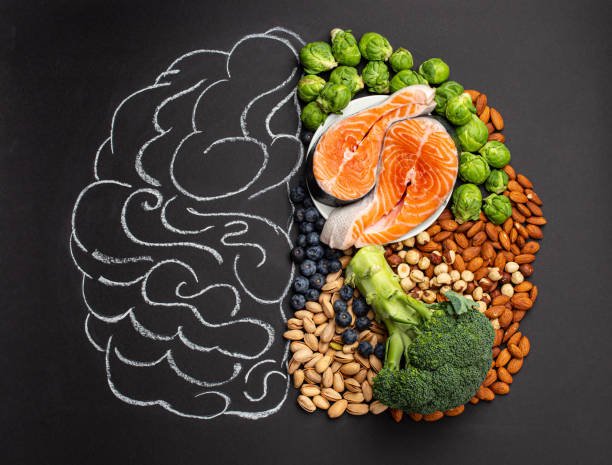
Here are some examples of formulated supplements containing neutraceuticals:
Omega-3 Fatty Acids and Vitamin D: Combining omega-3 fatty acids, found in fish oil, with vitamin D has shown promise in supporting mood regulation and cognitive function. Omega-3 fatty acids help reduce inflammation in the brain, while vitamin D plays a role in neurotransmitter synthesis and function.
L-Theanine and Caffeine: L-Theanine, an amino acid found in green tea, when combined with caffeine, can promote focus, attention, and cognitive performance. While caffeine provides stimulation, L-theanine has calming effects, resulting in a balanced state of alertness without the jitters.
Curcumin and Piperine: Curcumin, the active compound in turmeric, has anti-inflammatory and antioxidant properties that may benefit mood and cognitive function. Piperine, found in black pepper, enhances the absorption of curcumin, maximizing its bioavailability and effectiveness.
Magnesium and B Vitamins: Magnesium plays a crucial role in neurotransmitter function and stress response regulation. Combining magnesium with B vitamins, particularly B6, B9 (folate), and B12, supports energy production, neurotransmitter synthesis, and mood stabilization.
Probiotics and Prebiotics: Gut health has been linked to mental health, with emerging research suggesting a connection between the gut microbiome and mood regulation. Combining probiotics (beneficial bacteria) with prebiotics (fiber that feeds these bacteria) supports a healthy gut microbiome, potentially improving mood and cognitive function.
Ashwagandha and Rhodiola Rosea: Adaptogenic herbs like ashwagandha and rhodiola rosea help the body adapt to stress and promote resilience. Combining these herbs in a nutraceutical blend can support stress management, reduce anxiety, and enhance mental clarity and focus.
Ginkgo Biloba and Ginseng: Ginkgo biloba and ginseng are botanicals with neuroprotective and cognitive-enhancing properties. Combining these herbs in a blend can improve memory, concentration, and overall cognitive function, making them beneficial for mental clarity and focus.
These neutraceutical supplement combinations harness the collective strength of their ingredients to assist with various aspects of mental well-being, such as mood stabilization, stress management, cognitive clarity, and overall emotional balance. As scientific understanding progresses, these blends provide a promising avenue for enhancing mental health support.
Gut Microbiota Modulation
The growing area of psychobiotics focuses on therapies that aim to influence the gut microbiota using probiotics and prebiotics. This approach marks an exciting new chapter in treating neuropsychiatric conditions. Recent studies have revealed the intricate relationship between the gut microbiota and the brain, uncovering a complex network of communication pathways that deeply affect mental well-being.
At the forefront of this shift in understanding, is the acknowledgment of the gut-brain axis, a two-way communication network connecting the digestive system with the central nervous system. This complex system enables ongoing communication between the gut microbiota, which consists of trillions of microorganisms in the digestive system, and the brain. This interaction has wide-ranging effects on neurochemical signaling, immune function, and neural pathways.
At the core of the healing potential of psychobiotics is their ability to change the types and actions of bacteria in your gut. This can have a big impact on how your brain works and how you act. Probiotics, which contain helpful bacteria like Lactobacillus and Bifidobacterium strains, and prebiotics, which feed these good bacteria, offer great hope for rebalancing the mix of microbes in your gut and improving your mental well-being.

Here’s a dietary meal plan rich in both prebiotics and probiotics:
Breakfast:
– Greek type yogurt parfait with mixed berries (blueberries, strawberries, raspberries) and a sprinkle of ground flaxseeds. Greek yogurt is rich in probiotics, while berries and flaxseeds provide prebiotic fiber.
– Whole grain toast topped with mashed avocado and sliced tomatoes.
Mid-Morning Snack:
– Banana smeared with peanut butter
– whole grain crackers with mashed avocado
– Kefir, a fermented dairy drink rich in probiotics.
Lunch:
– Quinoa salad with mixed greens, cherry tomatoes, cucumber, bell peppers, and chickpeas. Drizzle with olive oil and lemon juice. Chickpeas are a source of prebiotic fiber.
– Grilled chicken breast or tofu for protein.
Afternoon Snack:
– Carrot and celery sticks with hummus. Chickpeas in hummus provide both prebiotics and probiotics.
Dinner:
– Baked salmon seasoned with herbs and lemon. Salmon provides omega-3 fatty acids and protein.
– Steamed asparagus with garlic and olive oil. Asparagus is a source of prebiotic fiber.
– Mashed sweet potatoes. Sweet potatoes are rich in fiber and vitamins.
Evening Snack (optional):
– A small bowl of plain kefir or yogurt with a drizzle of honey.
– A handful of mixed berries for additional prebiotic fiber.
Hydration throughout the day:
– Drink plenty of water, herbal teas, or kombucha, a fermented tea rich in probiotics.
This meal plan includes a variety of foods rich in both prebiotics and probiotics to support gut health. Prebiotics, such as fiber-rich vegetables, fruits, nuts, and whole grains, feed the beneficial bacteria in the gut, while probiotics, found in fermented foods like yogurt, kefir, and kimchi, introduce beneficial bacteria directly into the digestive system. This combination promotes a healthy balance of gut microbiota, which is essential for digestion, nutrient absorption, immune function, and overall well-being.
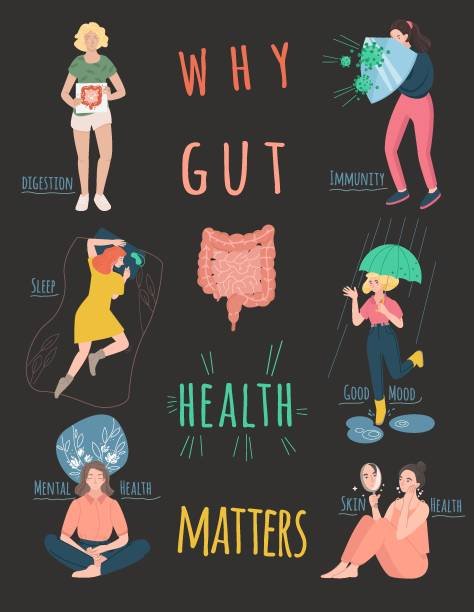
Research studies looking into the effectiveness of psychobiotics for mental health issues have shown encouraging findings. Evidence indicates that psychobiotics could be helpful in reducing symptoms of depression, anxiety, and even conditions like autism spectrum disorders. By increasing the number of helpful bacteria in your gut, psychobiotics might help correct abnormal communication between the immune system and the brain, which is thought to play a role in these disorders.
Furthermore, it’s important to note the mental health effects of specific substances produced by microbes, like short-chain fatty acids. These substances highlight the complex ways in which the bacteria in your gut can affect how your brain functions. For instance, they can influence how your brain makes neurotransmitters, how your brain cells communicate with each other, and how much inflammation occurs in your brain. All of these factors play a significant role in regulating your mood and cognitive abilities.
Here’s a sample meal plan considering short-chain fatty acids and dietary sources of neurotransmitter precursors that supports a healthy gut microbiota and promotes brain function:
Breakfast:
– Overnight oats made with rolled oats, almond milk, chia seeds, and a tablespoon of ground flaxseeds. Flaxseeds are a source of alpha-linolenic acid, a precursor to omega-3 fatty acids.
– Topped with sliced bananas and a sprinkle of cinnamon. Bananas contain tryptophan, a precursor to serotonin, a neurotransmitter involved in mood regulation.
Mid-Morning Snack:
– A small handful of walnuts and almonds. Walnuts contain alpha-linolenic acid, while almonds provide magnesium, which supports neurotransmitter function.
– A piece of dark chocolate. Dark chocolate contains flavonoids that may support brain health.
Lunch:
– Quinoa salad with mixed greens, cherry tomatoes, cucumbers, bell peppers, and chickpeas. Chickpeas are a source of tryptophan.
– Drizzled with a dressing made with extra virgin olive oil, lemon juice, and a dash of turmeric. Olive oil and turmeric may have anti-inflammatory effects on the brain.
Afternoon Snack:
– Greek type yogurt with mixed berries (blueberries, strawberries, raspberries). Greek yogurt contains probiotics that support gut health, while berries provide antioxidants.
– Sprinkled with pumpkin seeds, which are rich in magnesium and zinc.
Dinner:
– Grilled salmon seasoned with herbs and lemon. Salmon is a source of omega-3 fatty acids, which support brain health.
– Steamed broccoli and sautéed spinach. Leafy greens are rich in folate, a B-vitamin that supports neurotransmitter synthesis.
– Served with a side of quinoa, which provides protein and fiber.
Evening Snack (optional):
– A cup of herbal tea, such as chamomile or peppermint, to promote relaxation and digestion.
– A small serving of whole grain crackers with hummus. Chickpeas in hummus provide prebiotic fiber.
Hydration throughout the day:
– Drink plenty of water and herbal teas to stay hydrated and support digestion.
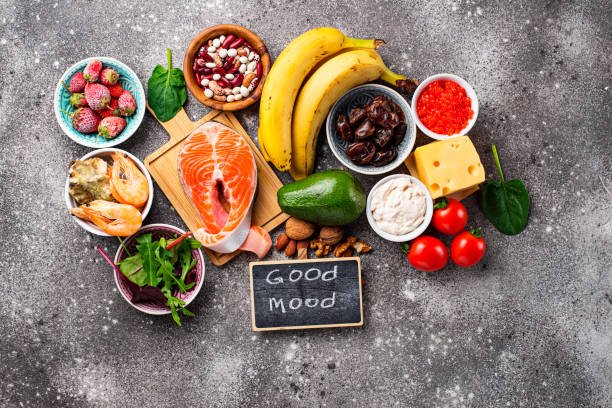
This meal plan incorporates foods that provide nutrients and compounds beneficial for brain health and gut-brain communication. By including sources of omega-3 fatty acids, neurotransmitter precursors, prebiotic fiber, and probiotics, it supports the production of microbial metabolites and neurotransmitters that may influence mood, cognition, and overall brain function. Additionally, emphasizing whole, nutrient-dense foods helps maintain a healthy gut microbiota, which plays a critical role in supporting brain health.
Impact on Brain Function
We’re increasingly realizing the powerful impact of our dietary choices on brain function and mental health, particularly when it comes to a process called “adult hippocampal neurogenesis”, also known as neuroplasticity. This process involves the generation of new brain cells in the hippocampus, a region critical for learning, memory, and emotional regulation. The mounting evidence suggests that our food intake significantly influences this process, offering promising opportunities to enhance cognitive abilities and mood by making adjustments to our lifestyle and diet.
At the forefront of research into the relationship between nutrition and hippocampal neurogenesis lies a growing understanding of the intricate mechanisms through which dietary components exert their effects on our brain cells within the hippocampus.
Key nutrients, such as omega-3 fatty acids, polyphenols, and micronutrients like folate and vitamin E, have been shown to promote neurogenesis by enhancing cell growth, survival, and multiplication of cells. This ultimately contributes to improved brain function and overall cognitive health.
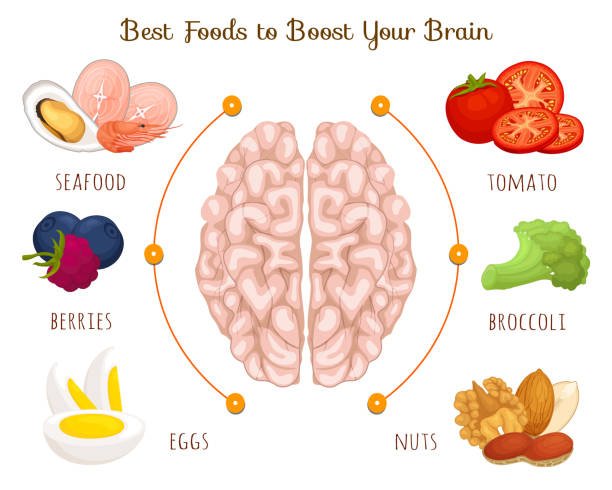
For example, omega-3 fatty acids, which are found in fatty fish, flaxseeds, and walnuts, help create new brain cells by adjusting neurotransmitter systems, decreasing inflammation, and encouraging the production of important substances (e.g. proteins, hormones etc.) needed for brain cell growth and survival. Likewise, polyphenols found in fruits, vegetables, and green tea protect the brain and help it adapt by improving connections between brain cells and creating a supportive environment for making new brain cells.
Furthermore, micronutrients such as folate, vitamin E, and zinc play integral roles in DNA synthesis, antioxidant defense, and neurons communication, implicated in neurogenesis. Deficiencies in these micronutrients have been linked to impaired hippocampal function and increased susceptibility to mood disorders, highlighting the importance of a nutrient-rich diet for supporting optimal brain health.
Beyond individual nutrients, dietary patterns such as the Mediterranean diet, rich in fruits, vegetables, whole grains, and healthy fats, have garnered attention for their potential to promote hippocampal neurogenesis and improve cognitive function and mood. This dietary pattern provides a diverse array of bioactive compounds with synergistic effects on brain health, fostering an anti-inflammatory milieu and enhancing neuroplasticity.
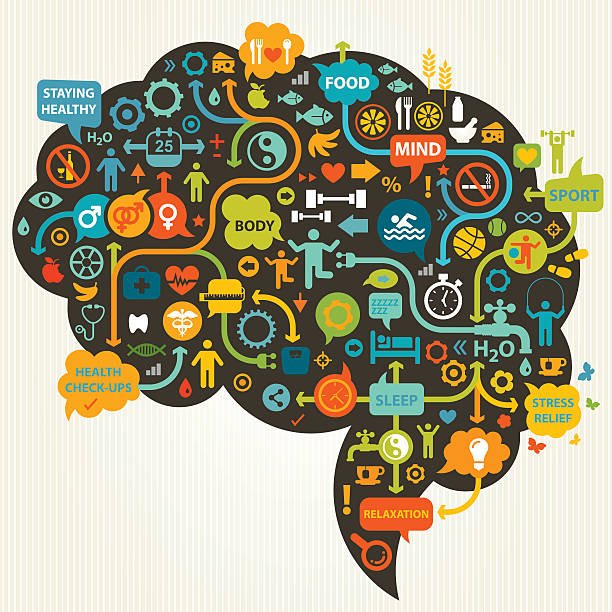
Here’s an inspired dietary meal plan featuring foods to support hippocampal neurogenesis and overall brain health:
Breakfast:
Smashed Avocado Toast with Poached Eggs:
– Whole grain toast topped with smashed avocado, cherry tomatoes, and a poached egg.
– Sprinkle with hemp seeds for omega-3 fatty acids and fiber.
– Beverage: Green tea for antioxidants and L-theanine.
Mid-Morning Snack:
Greek Yogurt Parfait with Berries and Almonds:
– Greek yogurt parfait layered with mixed berries (blueberries, strawberries) and almonds.
– Drizzle with honey for sweetness and additional antioxidants.
– Beverage: Coconut water for hydration and electrolytes.
Lunch:
Quinoa Salad with Roasted Vegetables and Grilled Chicken:
– Quinoa salad with roasted vegetables (bell peppers, zucchini, onions) and grilled chicken.
– Toss with a lemon-tahini dressing for flavor and healthy fats.
– Beverage: Iced herbal tea with lemon and mint for refreshment.
Afternoon Snack:
Antioxidant Trail Mix:
– Trail mix made with mixed nuts (almonds, walnuts, pistachios), dried fruits (goji berries, dried apricots), and dark chocolate chips.
– Sprinkle with cinnamon for added flavor and potential cognitive benefits.
– Beverage: Sparkling water with a splash of pomegranate juice for antioxidants.
Dinner:
Baked Salmon with Quinoa and Steamed Broccoli:
– Baked salmon seasoned with herbs and lemon, served with a side of quinoa pilaf.
– Steamed broccoli with a drizzle of olive oil and a sprinkle of parmesan cheese.
– Beverage: Hibiscus tea for antioxidants and hydration.
Evening Snack (optional):
Peanut Butter Banana Smoothie:
– Peanut butter banana smoothie made with banana, peanut butter, almond milk, and a dash of cinnamon.
– Add a scoop of chia seeds for omega-3 fatty acids and fiber.
– Beverage: Golden milk latte made with turmeric, ginger, and coconut milk for anti-inflammatory benefits and relaxation.
This inspired meal plan incorporates functional foods rich in antioxidants, omega-3 fatty acids, and other nutrients known to support hippocampal neurogenesis and overall brain health. With straightforward recipes and accessible ingredients, it offers a delicious and nutritious approach to enhancing cognition and mood through dietary interventions.

Moreover, emerging research suggests that caloric restriction, intermittent fasting, and ketogenic diets, may exert neurogenic effects through metabolic and hormonal pathways. These dietary habits can help your cells handle stress better, boost the production of brain-boosting chemicals, and encourage the growth of new mitochondria, the cell’s powerhouses. This all supports the creation of new brain cells in the hippocampus and improves your brain’s ability to bounce back from challenges.
In conclusion, what we eat has a big impact on our brain and how we feel emotionally. By making smart food choices, we can actually help our brains grow new cells in the hippocampus, which is great for our thinking, mood, and overall brain health. As scientists learn more about how food affects our brains, it’s becoming clear that eating well could be a key way to keep our brains strong and healthy throughout our lives.
As our understanding of how food influences our brains grows, it’s evident that nourishing ourselves properly could be the ultimate secret to maintaining lifelong brain power and vitality.
For more information and personalised advice on Nutrition and Mental-Wellness feel free to contact me or consult with your dietician.
Indicative Bibliography:
Owen L, Corfe B. The role of diet and nutrition on mental health and wellbeing. Proc Nutr Soc. 2017 Nov;76(4):425-426. doi: 10.1017/S0029665117001057. Epub 2017 Jul 14. PMID: 28707609.
Dalle Grave R. Nutrition and Fitness: Mental Health. Nutrients. 2020 Jun 17;12(6):1804. doi: 10.3390/nu12061804. PMID: 32560426; PMCID: PMC7353309.

